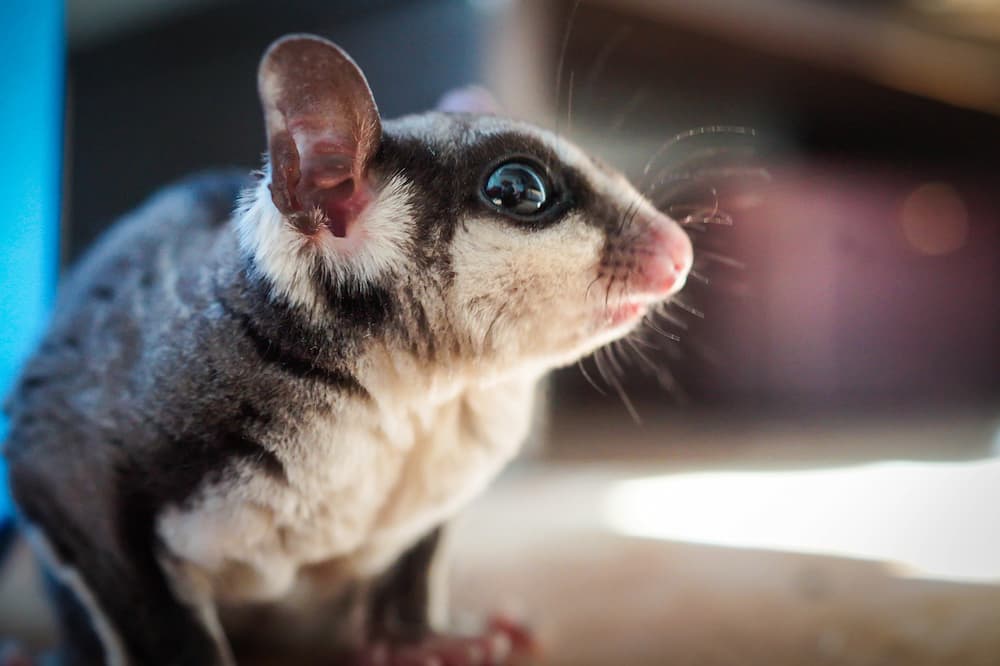Quicklinks
- Does A Sugar Glider Bite Hurt?
- Why Does My Sugar Glider Nibble On Me?
- When Sugar Gliders Bite
- Sugar Gliders And Their Cage Mates
Whenever you try to introduce your sugar glider to a friend or member of your family, do you ever get questions like “do sugar gliders bite?” or “does a sugar glider bite hurt?”
As sugar gliders are fairly small in size, it’s easy to assume that they’re going to be either be a nibbler or a biter.
Approaching someone’s pet can be a nervous experience, especially for younger kids if they previously got bit. However, as with most animals, biting and chewing all come down to a sugar glider being properly socialised.
Often, animals will bite when they’re uncomfortable or scared, as that’s the only way that they know how to communicate at the time. However, some animals may also bite when they’re happy or satisfied. So how can you tell the difference and can you get a sugar glider to stop biting?
It’s a good idea to begin the process of training your sugar glider not to bite by learning about your sugar glider’s temperament. This will help ensure that your sugar glider isn’t handled when they are upset or perhaps not in the mood to be held. It will also help you to understand if your sugar glider is a happy biter, or if they only bite when they’re upset if they bite at all.
So, to get things started, let’s discuss the different types of sugar glider bites, what they mean and how you can avoid them in the future.
Does A Sugar Glider Bite Hurt?
A sugar glider can bite and can break the skin, but most of the time, a sugar glider’s bite shouldn’t hurt. The majority of sugar glider bites should be nothing more than nibbles that won’t break the skin, though if your sugar glider breaks the skin, make sure to disinfect the area.
Why Does My Sugar Glider Nibble On Me?
Nibbling, which is not considered chewing, is when a sugar glider softly or gently bites the same area repeatedly. Sugar gliders can tend to nibble while exploring, playing, or may nibble simply to learn more about their new surroundings.
Nibbles don’t normally hurt as they don’t usually require much pressure for a sugar glider to get the satisfaction they need.
Younger sugar gliders are known to nibble compared to older sugar gliders and may not understand the strength of their mouths at that age. That being said, a younger sugar glider may mistakenly break skin when nibbling as they might not fully understand that their owner is soft and squishy.
As sugar gliders get older, the sugar glider should learn which part of their human, they can nibble on without breaking skin. But why would the sugar glider continue nibbling on you? Well, it’s because nibbling is also a form of grooming.
Sugar glider mothers groom their young. That being said, if you have multiple sugar gliders you may notice that the most dominant sugar glider may groom their other cage mates.
Sugar gliders may also choose to groom or clean the humans that they love. This is commonly done by chewing or lightly nibbling on their fingers. If your sugar glider starts exhibiting this behaviour, it’s important to ensure that your sugar glider is not actually biting.
When Sugar Gliders Bite
As mentioned earlier, sometimes, when sugar gliders get scared or defensive, they may bite. This most commonly happens with a new sugar glider. They can proceed biting by some squeals, barks, shrieks or screams.
Take note of where your sugar glider’s safe spaces are and do your best not to remove them from these areas. Alternatively, let your sugar glider come to you or try calling them to you.
It may take some time before your sugar glider gets comfortable with you. If you know your sugar glider hasn’t had the easiest life, make sure you take things extremely slowly, even if it means not picking up your sugar glider for a few weeks.
Allow your sugar glider to acclimate to its new environment and try your best not to make quick movements, loud noises or spray any perfumes or fragrances around your sugar glider. Why these three factors? Well, not only can sugar gliders be afraid of loud noises and fast motion, as they may think that a predator is nearby, but sugar gliders can feel safer in places that smell familiar to them.
Sugar Gliders And Their Cage Mates
If you have multiple sugar gliders, they could be feeding off of each other’s energy. What do I mean by that? Well, sugar gliders have emotions, just like you.
If a sugar glider is having an off day, they may take their aggression out on you. For example, they may have gotten into a spat with their cage mate. The odd thing is, sometimes sugar gliders can be happy with their cage mate, then all of a sudden fall out with each other.
Again, in cases like this, it is a good idea to monitor your sugar gliders to ensure that they are not being aggressive or fighting each other. If you notice that they aren’t getting along, try separating them for a few days, if not a week, until they have fully calmed down.
The smallest things can set off a sugar glider, as mentioned previously. However, one of the most common reasons a sugar glider may begin biting again after being socialized is a lack of interaction.
When sugar gliders are ignored or left alone for long periods of time without being handled or cuddled, they may no longer be used to human interaction. Although that’s not to say that a day without attention is going to cause your sugar glider to bite you, however, if you aren’t spending the right amount of time or if you only interact with your sugar glider when feeding them, then this may happen.
Sugar gliders, however, can always be re-socialized and will get used to you once more.
Conclusion
Though sugar gliders can bite, it’s fairly easy and simple to train them out of the habit. The most important step though is to understand why it is your sugar glider is biting you.
In general, if a sugar glider is biting you out of aggression, leave them alone for the time being and allow them to acclimate to their environment. This is especially true for sugar gliders who have just been re-homed or brought into a new home.
If a sugar glider bites you whenever you try to pick them up and you’ve had your sugar glider for a while, make sure that you haven’t conditioned your sugar glider into believing that biting is the only way for them to get what they want. Instead, scoop up your sugar glider quickly and proceed with what you needed to do.








